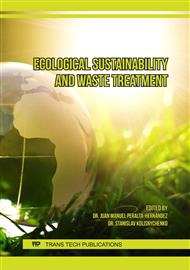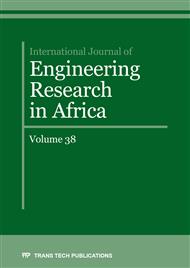[1]
P. Chalmin and C. Gaillochet, From Waste to Resource–World Waste Survey 2009. CyclOpe and Veolia Environmental Services, 2010,, ed: Paris, France: Edition Economica, (2010).
Google Scholar
[2]
A. Nabegu and A. Mustapha, Using Person Product Moment Correlation to explore the relationship between different categories of Municipal solid waste in Kano Metropolis, Northwestern Nigeria,, Journal of Environmental Health Science & Engineering, vol. 2, (2012).
Google Scholar
[3]
T. Ogwueleka, Municipal solid waste characteristics and management in Nigeria,, Journal of Environmental Health Science & Engineering, vol. 6, pp.173-180, (2009).
Google Scholar
[4]
Scheinberg, A., Wilson, D. C., & Rodic, L. (2010). Solid Waste Management in the World's Cities: in UN-Habitat's State of Water and Sanitation in the World's Cities Series. Published by Earthscan for UN-Habitat.
DOI: 10.4324/9781849774871
Google Scholar
[5]
kano.gov. (2011, 30 Jan ). Kano Brief. Available: http://kano.gov.ng/new/index.php.
Google Scholar
[6]
A. B. Nabegu, An analysis of municipal solid waste in Kano metropolis, Nigeria,, Journal of Human Ecology, vol. 31, pp.111-119, (2010).
DOI: 10.1080/09709274.2010.11906301
Google Scholar
[7]
Marshall, R. E., & Farahbakhsh, K. (2013). Systems approaches to integrated solid waste management in developing countries. Waste Management, 33(4), 988-1003.
DOI: 10.1016/j.wasman.2012.12.023
Google Scholar
[8]
United Nations. (2009, 22 Feb). UN Data / Country Profile / Nigeria. Available: http://data.un.org/CountryProfile.aspx?crName=NIGERIA.
Google Scholar
[9]
World Bank. (2011). Nigeria / Data. Available: http://data.worldbank.org/country/nigeria.
Google Scholar
[10]
D. C. Wilson, L. Rodic, A. Scheinberg, C. A. Velis, and G. Alabaster, Comparative analysis of solid waste management in 20 cities,, Waste Management & Research, vol. 30, pp.237-254, (2012).
DOI: 10.1177/0734242x12437569
Google Scholar
[11]
A. B. Nabegu and P. Wudil, An assessment of Refuse Management and Sanitation Board (REMASAB) Solid waste management in Kano metropolis,, Techno–Science Africana Journal, vol. 1, pp.101-108, (2008).
Google Scholar
[12]
Nabegu, A. B., & Mustapha, A. (2014). Enhancing awareness and participation of municipal solid waste management in Kano Metropolis, Nigeria. World Scientific News, 5, 46-53.
Google Scholar
[13]
Lewcock, C., 1995. Farmer use of urban waste in Kano. Habitat International 19 (2) 225–234.
DOI: 10.1016/0197-3975(94)00068-d
Google Scholar
[14]
Al Sabbagh, M. et al. (2012).
Google Scholar



